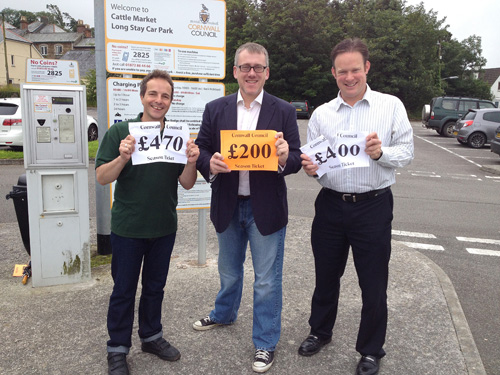
What’s the best way of asking people’s opinion? As a councillor, it is still the case that knocking on doors is the surest way of understanding what people think on an issue.
But what about when the issue you are concerned about is a council budget? With the best will in the world, no budget can be summarised into a thirty second doorstep pitch. That was the challenge I and my colleagues have faced over the past two months as we have been putting together Cornwall’s budget for next year.
Here’s the background. In May we got a new administration in Cornwall. Out went the Conservative led administration and in came a Lib Dem and Independent partnership. I got the role of cabinet member for finance and the need to cut £23.9 million next year (and up to £196 million by the end of a five year period from a net budget of around £525m).
Most of the easy pickings had already been done. Changing four years ago to a unitary council helped the last administration to save £170m with little effect on the front-line. And they had demanded small efficiency savings in every area, every year. We could continue with salami-slicing – chopping a bit off everywhere each year – but my fear is that we would end up like Monty Python’s Black Knight. We would have so many bits taken off that, although we would still have the head and sound like a council, we wouldn’t be able to actually do anything any more.
So our aim has been to understand what the people of Cornwall want our council to look like in five years’ time. Because, realistically, we cannot look the same as we do now. What services do residents want us to retain at all costs and which would they accept being delivered in another way or by another group. And, sadly, which services are they prepared to see lost altogether.
Here’s the special pleading bit. In Cornwall it costs about the same to deliver the full range of unitary services as it does in an urban council. Yet our government grant is around £100 per head, per year less than the best funded urban councils. And Cornwall is the poorest part of the UK – to the extent that we still receive EU structural funding.
Faced with these challenges, we wanted to ask the people of Cornwall. So we held public meetings the length and breadth of our area – 25 of them in all in six weeks. Most were evening meetings held in village halls and community centres. But we added in four afternoon events due to public demand. I’m not sure what I expected in the way of turnout, but they ranged from about 15 in the smallest village hall to just over 100 for the last event held in the council chamber in Truro. We didn’t send a vast team to each one – just me, a finance officer and the community network manager. The overall cost of the events themselves was around £600 for the lot.
This wasn’t about lecturing – although a key aim was to help people understand more about the challenges we face. So after a 10 minute presentation, the bulk of each 90 minute event was about a discussion. We encouraged people to put forward their ideas for how we could save money, how we could bring in more income and which services they would be prepared to see lost.
I didn’t expect anyone to become an expert in local government finance. But there were some fantastic ideas put forward. At every event we got something new that we had not previously considered or a nuance to help us tweak our proposals. We also got an insight into what local residents think is important. Sure, we got some misguided assumptions as well. But we got the chance to challenge these head on – something we couldn’t have done sat in County Hall.
Not surprisingly, the Conservatives branded the whole project a massive PR exercise. Over the past four years, their preference was to sit in their fourth floor offices and dictate to the people of Cornwall what was best for them. The only attempt at consultation was a series of four meetings organised by a scrutiny committee. But despite their condemnation, the Tories seemed to find the events useful, with their group leader coming to at least four of them and a couple of their PPCs coming to two each.
Of course, engagement through public meetings wasn’t our only method of consultation. We have used email, a YouChoose simulator, videos, a webcast and a staff survey to get more views in. But it has been the public meetings which I believe have done most to generate new ideas.
I don’t pretend that we have yet got it right. The financial challenge we face next year, and every year, is such that we need to do more. In particular, I want to find a way of getting meaningful budget consultation on the phones or on the doorstep. Can my fellow members of ALDC come up with any ideas? How do we get even more people to our public events? Is there a further way that we can use technology to consult? (And, in the meantime, if you know of a way of saving us £23.9 million, do tell…)